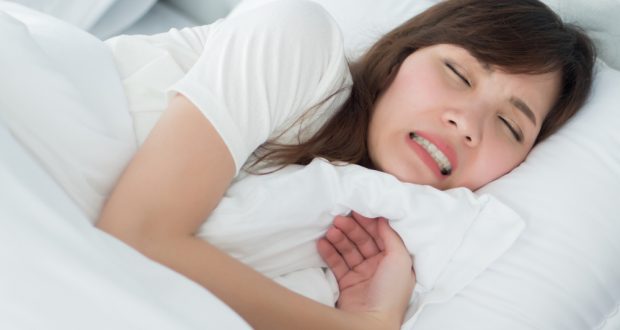By: Guest Author
Published: May 14, 2019
Written by Dr. Borvana Nikolova – Guest Contributor
Tooth grinding is one of the most under diagnosed problems in dentistry, affecting 80% of people.
It occurs when involuntary twitches in the tiny muscles that control your jaw cause your top and bottom teeth to rub against each other.
More women grind their teeth than men, and it can lead to chipped teeth, as well as enamel wear that can make your teeth more susceptible to sensitivity and cavities.
However, the most common symptom associated with tooth grinding is tension headaches. If you regularly wake up with a headache, then it is likely that tooth grinding is the cause of this (most tooth grinding occurs at night when you are asleep).
To help you prevent future headaches, enamel wear, and to make your teeth more resilient to cavities, here are five ways to prevent tooth grinding.
Take magnesium supplements
Taking magnesium supplements daily has been shown to reduce tooth grinding during both the day and night time.
This is because magnesium can help relax the tiny muscles in the jaw, the spasms of which are what cause you to grind your teeth.
Magnesium’s ability to increase your control of fast twitch muscles has also seen it be used in treatments for Parkinson’s disease.
Taking magnesium supplements can be a particularly effective means of reducing tooth grinding in women. This is due to the fact that natural levels of magnesium in the body can decrease during menstruation.
Cut down on stimulating activity before bed
One of the biggest contributors to people grinding their teeth is stress.
Although reducing and managing one’s stress is a very personal endeavour, there are some “easy wins” when it comes to minimizing the physiological manifestations of stress, one of which is tooth grinding.
These “easy wins” involve cutting down on behaviours that stimulate the nervous system such as consuming caffeine and alcohol, as well as exercising vigorously.
While it is unreasonable and, in the case of exercise, even unhealthy to cut out these habits altogether, you should try and avoid them within two hours of going to bed.
If you suspect that you grind your teeth at night then reducing such activities before bed may well help to reduce this.
Stay hydrated
Dehydration can increase your propensity to grind your teeth due to the extra physiological stress that it puts on your body.
Therefore drinking more water than you usually do can help reduce tooth grinding.
As you are unable to take on water while you sleep, dehydration can play a particularly significant role in tooth grinding during the night time.
Therefore you should aim to drink at least one pint of water during the final hour before you go to sleep. Ideally you want to be drinking another pint of water in the hour before that.
Try to drink more water if you have been drinking alcohol or have done some vigorous exercise during the day.
Consider orthodontic treatments
This may seem like an extreme measure to take against tooth grinding, but if you are certain that grinding your teeth is significantly affecting your well being, then it may be worth getting orthodontic treatment to reduce the amount you grind.
Straightening your teeth can reduce tooth grinding because tooth grinding occurs when your mouth is trying to find a comfortable “resting” bite.
If your teeth are misaligned (as is the case with most people) you will never be able to find a “resting” bite that is perfectly comfortable for all your teeth.
You make up for this continuous discomfort by constantly adjusting your bite, grinding your teeth against each other as you do so.
Therefore straightening your teeth will help you achieve a more comfortable “resting” bite, and reduce your involuntary urge to grind your teeth.
Get a specialised “tooth grinding appliance” to wear at night
This is, by a distance, the most effective way to stop you from grinding your teeth.
If you know that you grind your teeth, I would highly recommend you invest in one of these.
A “tooth grinding appliance” is a thin acrylic covering for your teeth that to wear at night.
It is similar to a mouth guard that you wear for contact sports but it is thinner (and therefore more comfortable) and made out of acrylic rather than rubber.
The appliance works in two ways.
Firstly it adjusts your bite to its most comfortable “resting” position. This will greatly reduce the urge to grind your teeth.
Additionally, the appliance acts as a shock absorber to any residual grinding. This means that the damage done to your teeth, and the strain to your jaw muscles (which causes headaches) due to tooth grinding will be minimised.
These appliances can be custom made by most dentists, and should feel comfortable to wear in bed after a few nights of getting used to it.
It could free you of any future morning headaches.
 Dr Boryana Nikolova is the owner and Principal Dentist of 92 Dental, a dental practice in London, England. She has a passion for preventative dentistry and wants to put dentistry on the same footing as other forms of medicine where problems are mitigated by lifestyle choices and good habits rather than invasive procedures.
Dr Boryana Nikolova is the owner and Principal Dentist of 92 Dental, a dental practice in London, England. She has a passion for preventative dentistry and wants to put dentistry on the same footing as other forms of medicine where problems are mitigated by lifestyle choices and good habits rather than invasive procedures.
The views expressed herein this article, written by a guest contributor, do not necessarily represent those of the Red Hot Mamas organization. The content is for informational purposes and should not substitute the advice of your doctor.
 Red Hot Mamas In Charge of Change.
Red Hot Mamas In Charge of Change.

